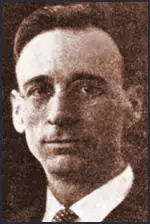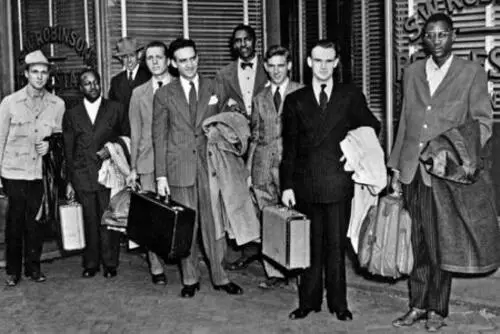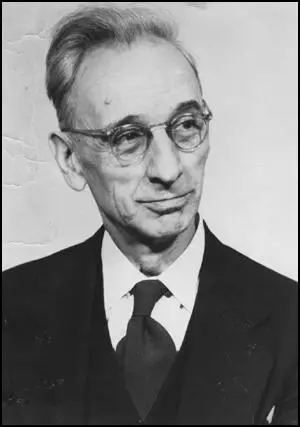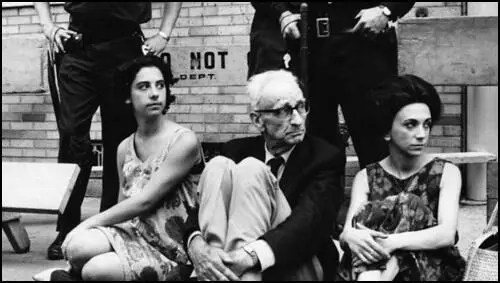Abraham Muste

Abraham Muste was born in Zierkzee, Holland, on 8th January, 1885. His family moved to the United States in 1891. His father was supporter of the Republican Party and as a young man he shared his conservative views. In 1909 he was ordained a minister in the Dutch Reformed Church.
Muste became increasingly radical and in the 1912 presidential campaign supported Eugene Debs, the Socialist Party candidate. On the outbreak of the First World War Muste left the Dutch Reformed Church and became a pacifist. In 1919 he played an active role in supporting workers during the Lawrence Textile Strike and later moved to Boston where he found work with the American Civil Liberties Union. In the early 1920s Muste worked as director of the Brookwood Labor College in Katonah, Westchester County. He also joined the Fellowship of Reconciliation (FOR).
American Workers Party
Muste was disturbed by the events that were taking place in the Soviet Union. He no longer felt he could support the policies of Joseph Stalin. Muste now decided to join with other like-minded people to form the American Workers Party (AWP). Established in December, 1933, Muste became the leader of the party and other members included Sidney Hook, Louis Budenz, James Rorty, V.F. Calverton, George Schuyler, James Burnham, J. B. S. Hardman and Gerry Allard.
Hook later argued in his autobiography, Out of Step: An Unquiet Life in the 20th Century (1987): "The American Workers Party (AWP) was organized as an authentic American party rooted in the American revolutionary tradition, prepared to meet the problems created by the breakdown of the capitalist economy, with a plan for a cooperative commonwealth expressed in a native idiom intelligible to blue collar and white collar workers, miners, sharecroppers, and farmers without the nationalist and chauvinist overtones that had accompanied local movements of protest in the past. It was a movement of intellectuals, most of whom had acquired an experience in the labor movement and an allegiance to the cause of labor long before the advent of the Depression."
Soon after its formation of the AWP, leaders of the Communist League of America (CLA), a group that supported the theories of Leon Trotsky, suggested a merger. Sidney Hook, James Burnham and J. B. S. Hardman were on the negotiating committee for the AWP, Max Shachtman, Martin Abern and Arne Swabeck, for the CLA. Hook later recalled: "At our very first meeting, it became clear to us that the Trotskyists could not conceive a situation in which the workers' democratic councils could overrule the Party or indeed one in which there would be plural working class parties. The meeting dissolved in intense disagreement." However, despite this poor beginning, the two groups merged in December 1934.
Fellowship of Reconciliation
In 1940 Muste was appointed executive secretary of the Fellowship of Reconciliation (FOR). In this position Muste led the campaign against United States involvement in the Second World War. In 1942 Muste encouraged James Farmer and Bayard Rustin to establish the Congress on Racial Equality (CORE). Early members included George Houser and Anna Murray. Members were mainly pacifists who had been deeply influenced by Henry David Thoreau and the teachings of Mahatma Gandhi and the nonviolent civil disobedience campaign that he used successfully against British rule in India. The students became convinced that the same methods could be employed by blacks to obtain civil rights in America.
After the war Muste joined with David Dillinger and Dorothy Day to establish the Direct Action magazine in 1945. Dellinger once again upset the political establishment when he criticised the use of atomic bombs on Hiroshima and Nagasaki.
Journey of Reconciliation
In early 1947, CORE announced plans to send eight white and eight black men into the Deep South to test the Supreme Court ruling that declared segregation in interstate travel unconstitutional. organized by George Houser and Bayard Rustin, the Journey of Reconciliation was to be a two week pilgrimage through Virginia, North Carolina, Tennessee and Kentucky.
The Journey of Reconciliation began on 9th April, 1947. The team included George Houser, Bayard Rustin, James Peck, Igal Roodenko, Joseph Felmet, Nathan Wright, Conrad Lynn, Wallace Nelson, Andrew Johnson, Eugene Stanley, Dennis Banks, William Worthy, Louis Adams, Worth Randle and Homer Jack.

Randle, Wallace Nelson, Ernest Bromley, James Peck, Igal Roodenko,
Bayard Rustin, Joseph Felmet, George Houser and Andrew Johnson.
Members of the Journey of Reconciliation team were arrested several times. In North Carolina, two of the African Americans, Bayard Rustin and Andrew Johnson, were found guilty of violating the state's Jim Crow bus statute and were sentenced to thirty days on a chain gang. However, Judge Henry Whitfield made it clear he found that behaviour of the white men even more objectionable. He told Igal Roodenko and Joseph Felmet: "It's about time you Jews from New York learned that you can't come down her bringing your niggers with you to upset the customs of the South. Just to teach you a lesson, I gave your black boys thirty days, and I give you ninety."
The Journey of Reconciliation achieved a great deal of publicity and was the start of a long campaign of direct action by the Congress of Racial Equality. In February 1948 the Council Against Intolerance in America gave George Houser and Bayard Rustin the Thomas Jefferson Award for the Advancement of Democracy for their attempts to bring an end to segregation in interstate travel.
Freedom Riders
The Congress of Racial Equality also organised Freedom Rides in the Deep South. In Birmingham, Alabama, one of the buses was fire-bombed and passengers were beaten by a white mob. Norman Thomas described these young people as "secular saints" I. F. Stone has argued: They and a few white sympathizers as youthful and devoted as themselves have begun a social revolution in the South with their sit-ins and their Freedom Rides. Never has a tinier minority done more for the liberation of a whole people than these few youngsters of C.O.R.E. (Congress for Racial Equality) and S.N.C.C. (Student Non-Violent Coordinating Committee)."

By 1961 Congress of Racial Equality had 53 chapters throughout the United States. Two years later, the organization helped organize the famous March on Washington. On 28th August, 1963, more than 200,000 people marched peacefully to the Lincoln Memorial to demand equal justice for all citizens under the law. At the end of the march Martin Luther King made his famous "I Have a Dream" speech.

Muste was also very active in the War Resisters League and helped influence civil rights leaders such as Martin Luther King and Whitney Young, to oppose the Vietnam War.
During the war, Muste stood outside the White House every night, holding a candle in solitary protest. One night a reporter finally approached him and asked, "Sir, do you really think you are going to change the policies of this country by standing out here alone every night with a candle?" He replied, "I don't do this to change the country. I do this so the country won't change me."
Abraham Muste died on 11th February, 1967.
Primary Sources
(1) Bayard Rustin wrote an article for the Louisiana Weekly, to reply to what Thurgood Marshall had said about the Congress on Racial Equality's decision to organize the Journey of Reconciliation (1st April, 1947)
I am sure that Marshall is either ill-formed on the principles and techniques of nonviolence or ignorant of the process of social change.
Unjust social laws and patterns do not change because supreme courts deliver just decisions. One needs merely to observe the continued practice of Jim Crow in interstate travel, six months after the Supreme Court's decision, to see the necessity of resistance. Social progress comes from struggle; all freedom demands a price.
At times freedom will demand that its followers go into situations where even death is to be faced. Resistance on the buses would, for example, mean humiliation, mistreatment by police, arrest, and some physical violence inflicted on the participants.
But if anyone at this date in history believes that the "white problem," which is one of privilege, can be settled without some violence, he is mistaken and fails to realize the ends to which men can be driven to hold on to what they consider their privileges.
This is why Negroes and whites who participate in direct action must pledge themselves to non-violence in word and deed. For in this way alone can the inevitable violence be reduced to a minimum.
(2) Instructions produced by George Houser and Bayard Rustin for the Journey of Reconciliation (April, 1947)
If you are a Negro, sit in a front seat. If you are white, sit in a rear seat.
If the driver asks you to move, tell him calmly and courteously: "As an interstate passenger I have a right to sit anywhere in this bus. This is the law as laid down by the United States Supreme Court".
If the driver summons the police and repeats his order in their presence, tell him exactly what you said when he first asked you to move.
If the police asks you to "come along," without putting you under arrest, tell them you will not go until you are put under arrest.
If the police put you under arrest, go with them peacefully. At the police station, phone the nearest headquarters of the NAACP, or one of your lawyers. They will assist you.
(3) Sidney Hook, Out of Step: An Unquiet Life in the 20th Century (1987)
The center of the story is the career of the Reverend Abraham J. Muste, who in the early fall of 1933 invited me and other radical figures to organize a new political party, whose chief spokesman he became.
In his graphic but tendentious History of the Russian Revolution, Leon Trotsky wrote that the Revolution entered history under the belly of a Cossack horse. The irresolute act of the horseman, the unwonted failure to cut down the demonstrator, typified the breakdown of morale among the Czar's defenders in the February days of 1917. Perhaps one can say of A. J. Muste that he entered the labor movement under the hoofs of a mounted policeman's horse as he was marching with some striking pickets at Lawrence, Massachusetts. Without formally leaving the Dutch Reformed and then Presbyterian Church, he became a labor organizer and educator of note. He founded and headed for many years the Brookwood Labor College, whose students were recruited from the labor movement to serve it with dedication and intelligence. At the end of the twenties, Muste's interests had become more political and, as the depression deepened, intensely so. He had early experienced the effects of the Machiavellian behavior of the Communist Party, whose officials alternatively flattered and denounced him. Muste was convinced that only a political party thoroughly in the American grain would make any headway in the United States. He had followed my writings closely, was aware of my pragmatic orientation, and proposed that I join the organizing committee of the new party.
Our personal relations were always cordial, and remained so during the long and unexpected odyssey that took him from his original pacifist persuasion to pragmatic liberalism and socialism, to revolutionary Trotskyism (so extreme that it was repudiated by Trotsky himself), then back to the arms of God and an absolute pacifism in whose odor of sanctity he spent his last days. There was no inkling of these developments when the American Workers' Party was launched without fanfare after a few months of intense preparation.
The American Workers Party (AWP) was organized as an authentic American party rooted in the American revolutionary tradition, prepared to meet the problems created by the breakdown of the capitalist economy, with a plan for a cooperative commonwealth expressed in a native idiom intelligible to blue collar and white collar workers, miners, sharecroppers, and farmers without the nationalist and chauvinist overtones that had accompanied local movements of protest in the past. It was a movement of intellectuals, most of whom had acquired an experience in the labor movement and an allegiance to the cause of labor long before the advent of the Depression....
On the eve of the merger between the two organizations (the Trotskyists changed their tune completely at subsequent meetings and hypocritically professed agreement with us), I published an article entitled "Workers' Democracy," which argued for a "commonsense democratic way out of the impasse of capitalism" and maintained that the ideals enshrined in the American revolutionary tradition, "equality of opportunity," "the equal rights of all citizens to life, liberty and the pursuit of happiness," "peace and security for the masses" could best be realized under socialism. Despite this emphasis on democracy, it suffered from the old illusion that the fundamental conflict was between socialism and capitalism rather than between democracy and totalitarianism, but its emphasis on democracy, and the social and economic requirements for its fulfillment, were unmistakable. The article provoked a strong response from Will Herberg, the chief ideologist, after Bertram Wolfe, of the Lovestone Communist Opposition.
Herberg openly expressed the position that the outcome of workers' democracy could not be permitted to take its course if the consequences of that course, in the eyes of the Communist Party or its leadership, did not further the health of the revolution. It now became apparent why, to all Leninists, the spontaneous outcry of the Kronstadt sailors and their supporters, "The Soviets without the dictatorship of the Communist Party," was counterrevolutionary!
Although Muste claimed, after the merger with the CLA, to have been converted to the revolutionary Marxist-Leninist doctrine, I was never persuaded that he truly understood it or was motivated by it. He was first and foremost a moralist, not because he was a preacher or because of his religious training, but because he viewed human actions simply as right or wrong, regardless of context. To his credit he shrugged off expressions like "historically determined" or "organizationally necessary," but to be indifferent to what was possible or probable was something else again. He rarely thought through a position but would adopt one on moral grounds that were rarely affected by the facts in the case. He had been an ardent pacifist. When he became a revolutionary Marxist, he publicly abandoned his pacifism and, among us, his belief in Christianity. He could not have been very well versed in either one or the other, despite his religious training, for when he finally vomited up his hastily swallowed Marxism, he returned to his early beliefs with the passion of someone newly converted. It is very rare that, as individuals develop and abandon one position for another in a continuing series of progressions, they return to an earlier view. But it sometimes occurs. In Muste's case, his early abandonment of pacifism and Christianity could not have been very reflective.It is hard to explain why Muste, whose finger never stopped wagging in moral denunciation of the Stalinists for placing the fancied interests of their organization above everything else, consented to a merger of the American Workers' Party and the Trotskyist Communist League of America. He was not so completely an innocent as to believe that the Trotskyists had shed their Leninist tradition. Nor is it altogether clear why he opposed so stubbornly, after the two organizations had merged into the Socialist Workers' Party, the proposed entry of the latter into the Socialist Party, then moving rapidly to the left. The reason he himself gives is unpersuasive. He claims that, as a condition of merger with the Communist League of America, he exacted a promise from its leaders that they would not emulate the policy of the French Trotskyist group in entering the French Socialist Party. There was no such promise! As the chief figure representing the American Workers' Party in its negotiations, I can affirm that the subject never came up. Nor did it arise in the extended and heated debates among the AWP membership whether to approve the merger. Muste's stated opposition at the time to the entry of the merged organizations into the Socialist Party was that such an action would represent a betrayal of revolutionary principles. Since those principles were embodied in the principles Trotsky had drawn up for the Fourth International, Muste, so to speak, was claiming to be more Trotskyist than the Trotskyists. He berated the Trotskyists for being bad Marxists and bad Leninists.
Looking back, Muste's behavior was extremely puzzling. It reflected a personal ambition of which he was probably unconscious. Muste never really concealed his sense that he had a vocation for leadership, but after many long conversations I felt that his real vocation, for which he thirsted in the depths of his being, was for martyrdom. This came to the surface a few years later when, having returned to his early pacifist faith, he bitterly opposed American resistance to Hitler and the Japanese warlords. He conspicuously violated registration laws, sold his home and possessions, delivered eloquent addresses at several public farewell dinners by friends and admirers, and waited in vain for the minions of the state to cart him off to jail. He was thwarted by a sensible bureaucrat, for once, who decided to ignore him. The language in which he denounced "this dirty trick" was positively un-Christian. A.J. never recovered from this indignity, until the days of the Vietnam War when he came into his own.
(4) James Farmer, speech at Central State College, Wilberforce, Ohio, on 26th October, 1964.
The American Revolution was fought for a very simple reason - to establish the principle of liberty in our land. That revolution - that phase of it - was essentially successful. The principle was established but the principle did not include all Americans.
For many people it did not mean liberty. It did not, for example, apply to women in the early days of America. Women did not have the rights which were guaranteed to other Americans. They did not have even the right of suffrage, and they had to struggle to achieve that right. They struggled under the banner of the suffragettes and significantly, my friends, they used techniques which are quite similar to those which for the past several years have dominated the civil-rights movement.
This principle established in the eighteenth century in the first stage of the American Revolution did not include workers. Working men and women of our country got half the freedoms which had been proclaimed. They had no voice concerning their wages or hours or establishing their working conditions. That was not freedom. They then had to struggle for their freedom, for their own inclusion in the American compact of liberty. They fought hard with the same weapons - the demonstration, the march, the picket line, the boycott. They established the principle of their inclusion; they won the right to collective bargaining and the right for union recognition.
For many years like a great slumbering giant, Negroes accepted the status quo. For a long time, we thought so little of ourselves that we accepted segregation and discrimination, with all of its degradation.
The fight for freedom is combined with the fight for equality, and we must realize that this is the fight for America - not just black America but all America. In the words of the great rabbi who wrote, 2,000 years ago, "Hither, if I am not for myself, who will be for me; if I am for myself alone, what am I? If not now, when?"
(5) I. F. Stone, I. F. Stone's Weekly (4th June, 1962)
They and a few white sympathizers as youthful and devoted as themselves have begun a social revolution in the South with their sit-ins and their Freedom Rides. Never has a tinier minority done more for the liberation of a whole people than these few youngsters of C.O.R.E. (Congress for Racial Equality) and S.N.C.C. (Student Non-Violent Coordinating Committee).
(6) John Gates, The Story of an American Communist (1959)
A few people, including Mrs. Roosevelt, Norman Thomas and A. J. Muste, did support amnesty for us. These particular personalities had been staunch defenders of civil liberties throughout the years. But even here something bothered me. If any people were justified in not coming to our defense, it was just these three whom I have named. Had we not heaped personal and political abuse upon them (alternating with periods of praise)? I asked myself how we would have responded had the situation been reversed, and my answer was not a comforting one. I came to feel that these individuals must have a moral superiority over us, that there must be something decidedly wrong with the attitude of communism toward democracy.

